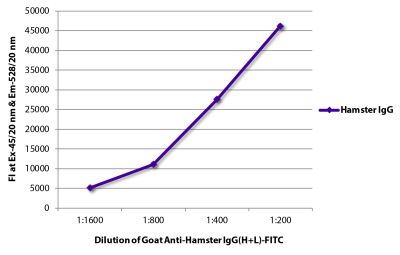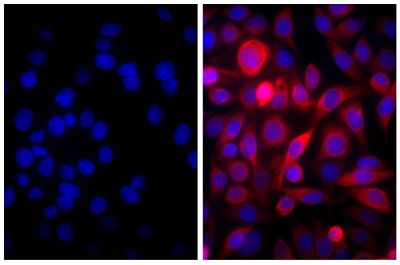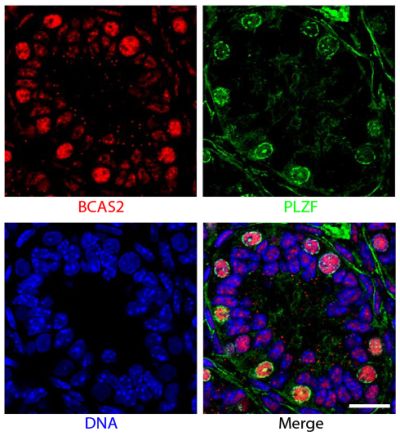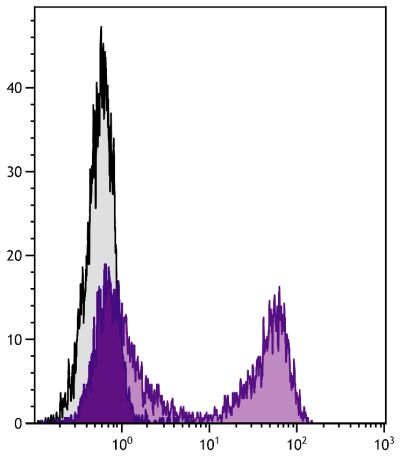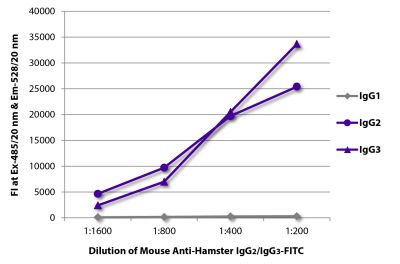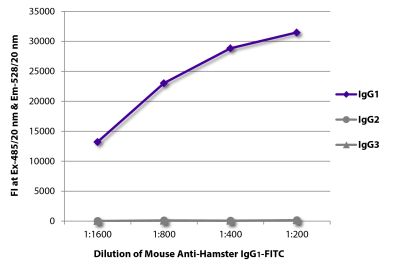Goat Anti-Hamster IgG(H+L), Mouse/Rat ads-FITC
Cat. No.:
6061-02
Goat Anti-Hamster IgG(H+L)-FITC antibody with minimal reactivity to mouse and rat proteins for use in flow cytometry, immunohistochemistry, and western blot assays.
$174.00
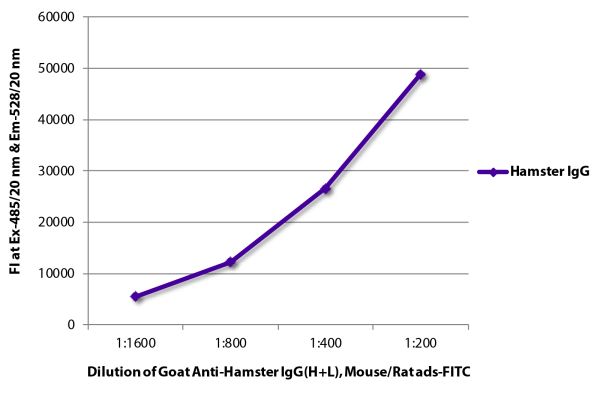

| Isotype | Goat IgG |
|---|---|
| Isotype Control | Goat IgG-FITC |
| Specificity | Reacts with the heavy and light chains of hamster IgG; may only react with Syrian hamster IgG |
| Source | Pooled antisera from goats hyperimmunized with hamster IgG |
| Cross Adsorption | Mouse and rat immunoglobulins and pooled sera; may react with immunoglobulins from other species and the light chains of other hamster immunoglobulins |
| Purification Method | Affinity chromatography on hamster IgG covalently linked to agarose |
| Conjugate | FITC (Fluorescein) |
| Buffer Formulation | Phosphate buffered saline containing < 0.1% sodium azide |
| Clonality | Polyclonal |
| Concentration | 1.0 mg/mL |
| Volume | 1.0 mL |
| Recommended Storage | 2-8°C; Avoid exposure to light |
| Applications |
Quality tested applications for relevant formats include - ELISA 1-5 FLISA Flow Cytometry 6-13 Other referenced applications for relevant formats include - Immunohistochemistry-Frozen Sections 10,14-16 Immunohistochemistry-Paraffin Sections 17 Western Blot 4,18-20 |
| RRID Number | AB_2796133 |
Documentation
Certificate of Analysis Lookup
Enter the Catalog Number and Lot Number for the Certificate of Analysis you wish to view
- 1. Shimizu T, Sano C, Tomioka H. The role of B7 molecules in the cell contact-mediated suppression of T cell mitogenesis by immunosuppressive macrophages induced with mycobacterial infection. Clin Exp Immunol. 2004;135:373-9. (ELISA)
- 2. Greer CE, Zhou F, Legg HS, Tang Z, Perri S, Sloan BA, et al. A chimeric alphavirus RNA replicon gene-based vaccine for human parainfluenza virus type 3 induces protective immunity against intranasal virus challenge. Vaccine. 2007;25:481-9. (ELISA)
- 3. Sonabend AM, Ulasov IV, Han Y, Rolle CE, Nandi S, Cao D, et al. Biodistribution of an oncolytic adenovirus after intracranial injection in permissive animals: a comparative study of Syrian hamsters and cotton rats. Cancer Gene Ther. 2009;16:362-72. (ELISA)
- 4. Martín-Martín I, Molina R, Jiménez M. An insight into the Phlebotomus perniciosus saliva by a proteomic approach. Acta Trop. 2012;123:22-30. (ELISA, WB)
- 5. Anosova NG, Brown AM, Li L, Liu N, Cole LE, Zhang J, et al. Systemic antibody responses induced by a two-component Clostridium difficile toxoid vaccine protect against C. difficile-associated disease in hamsters. J Med Microbiol. 2013;62:1394-404. (ELISA)
- 6. Razi-Wolf Z, Freeman GJ, Galvin F, Benacerraf B, Nadler L, Reiser H. Expression and function of the murine B7 antigen, the major costimulatory molecule expressed by peritoneal exudate cells. Proc Natl Acad Sci USA. 1992;89:4210-4. (FC)
- 7. Belani R, Weiner GJ. Expression of both B7-1 and CD28 contributes to the IL-2 responsiveness of CTLL-2 cells. Immunology. 1996;87:271-4. (FC)
- 8. Winzler C, Rovere P, Rescigno M, Granucci F, Penna G, Adorini L, et al. Maturation stages of mouse dendritic cells in growth factor-dependent long-term cultures. J Exp Med. 1997;185:317-28. (FC)
- 9. Yagi J, Dianzani U, Kato H, Okamoto T, Katsurada T, Buonfiglio D, et al. Identification of a new type of invariant Vα14+ T cells and responsiveness to a superantigen, Yersinia pseudotuberculosis-derived mitogen. J Immunol. 1999;163:3083-91. (FC)
- 10. Berney C, Herren S, Power CA, Gordon S, Martinez-Pomares L, Kosco-Vilbois MH. A member of the dendritic cell family that enters B cell follicles and stimulates primary antibody responses identified by a mannose receptor fusion protein. J Exp Med. 1999;190:851-60. (FC, IHC-FS)
- 11. Denda-Nagai K, Kubota N, Tsuiji M, Kamata M, Irimura T. Macrophage C-type lectin on bone marrow-derived immature dendritic cells is involved in the internalization of glycosylated antigens. Glycobiology. 2002;12:443-50. (FC)
- 12. Ohta R, Kondor N, Dohi N, Tomlinson S, Imai M, Holers VM, et al. Mouse complement receptor-related gene y/p65-neutralized tumor vaccine induces antitumor activity in vivo. J Immunol. 2004;173:205-13. (FC)
- 13. Pinon P, Pärssinen J, Vazquez P, Bachmann M, Rahikainen R, Jacquier M, et al. Talin-bound NPLY motif recruits integrin-signaling adapters to regulate cell spreading and mechanosensing. J Cell Biol. 2014;205:265-81. (FC)
- 14. Vestergaard C, Yoneyama H, Murai M, Nakamura K, Tamaki K, Terashima Y, et al. Overproduction of Th2-specific chemokines in NC/Nga mice exhibiting atopic dermatitis-like lesions. J Clin Invest. 1999;104:1097-105. (IHC-FS)
- 15. Chun K, Imai Y, Higashi N, Irimura T. Involvement of cytokines in the skin-to-lymph node trafficking of cells of the monocyte-macrophage lineage expressing a C-type lectin. Int Immunol. 2000;12:1695-703. (IHC-FS)
- 16. Kawasaki S, Takizawa H, Yoneyama H, Nakayama T, Fujisawa R, Izumizaki M, et al. Intervention of thymus and activation-regulated chemokine attenuates the development of allergic airway inflammation and hyperresponsiveness in mice. J Immunol. 2001;166:2055-62. (IHC-FS)
- 17. Huang SS, Liu I, Smith T, Shah MR, Johnson FE, Huang JS. CRSBP-1/LYVE-l-null mice exhibit identifiable morphological and functional alterations of lymphatic capillary vessels. FEBS Lett. 2006;580:6259-68. (IHC-PS)
- 18. Gao YH, Wang P, Takagi K, Shimozato O, Yagita H, Okigaki T, et al. Expression of a soluble form of CTLA4 on macrophage and its biological activity. Cell Res. 1999;9:189-99. (WB)
- 19. Müller-Röver S, Rossiter H, Paus R, Handjiski B, Peters EM, Murphy J, et al. Overexpression of Bcl-2 protects from ultraviolet B-induced apoptosis but promotes hair follicle regression and chemotherapy-induced alopecia. Am J Pathol. 2000;156:1395-405. (WB)
- 20. Martín-Martín I, Molina R, Jiménez M. Molecular and immunogenic properties of apyrase SP01B and D7-related SP04 recombinant salivary proteins of Phlebotomus perniciosus from Madrid, Spain. Biomed Res Int. 2013;2013:526069. (WB)
See More



